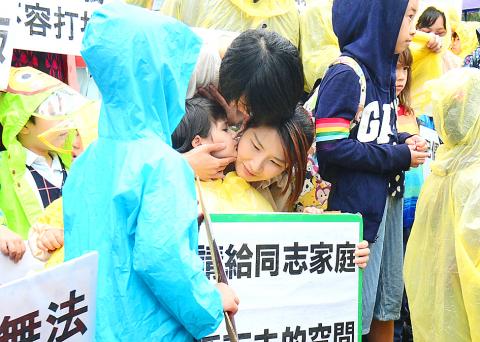More than 1,000 LGBT rights advocates and opponents yesterday demonstrated outside the Legislative Yuan in Taipei ahead of a cross-caucus negotiation on bills related to same-sex marriage.
At today’s cross-caucus negotiation, legislators are to discuss three bills that would, respectively, legalize same-sex marriage, same-sex unions or a same-sex family member registration system.
While the first bill, proposed by the Executive Yuan, would apply most of the marriage rights stated in the Civil Code to same-sex couples, the other two, which are based on suggestions from conservative groups and are respectively proposed by Democratic Progressive Party (DPP) Legislator Lin Tai-hua (林岱樺) and Chinese Nationalist Party (KMT) Legislator Lai Shyh-bao (賴士葆), would offer fewer rights to same-sex couples.

Photo: Wang Yi-sung, Taipei Times
To back the Executive Yuan’s bill, more than 40 same-sex couples yesterday rallied in front of the Legislative Yuan, some bringing their children.
“The Executive Yuan’s version has made some compromises, but it would still help protect families such as mine by allowing people to adopt the biological child of their same-sex spouse,” said Jay Lin (林志杰), who is raising twin sons with his partner.
The other two bills would at best give same-sex parents temporary guardianship over their non-biological children, he said.

Photo: Wang Yi-sung, Taipei Times
If those two bills were passed, “our family would be treated as a second-rate family,” he said.
Cindy, who with her partner of nine years is raising two children she conceived through artificial fertilization, said that her family is the same as every other.
“We love our children deeply. They are not missing anything in their life except for legal protection,” she said.
Should the Executive Yuan bill fail to pass, their children would not have a legal parent if she passed away, she said.
Meanwhile, more than 1,000 protesters led by the Happiness of the Next Generation Alliance rallied on a neighboring street to oppose the bill.
More than 7 million people last year voted in favor of keeping the definition of marriage as a union between a man and a woman, said alliance president Tseng Hsien-ying (曾獻瑩), who initiated the referendum.
“The referendum result cannot be changed by any legislator or even the president,” he said.
If the definition of marriage is altered, families, education and culture would face fundamental changes, he added.
The DPP has advocated for increased public participation in national policies through referendums, but now “only President Tsai Ing-wen (蔡英文) and the Council of Grand Justices are allowed to call the shots,” said Lai, who briefly joined the rally.
“There are only about a dozen grand justices, but we have more than 7 million people,” he added.
The Council of Grand Justices on May 24, 2017, declared the lack of language guaranteeing the right of same-sex couples to get married in the Civil Code unconstitutional, and required that a law or amendment be introduced to legalize same-sex marriage within two years.
The interpretation says that the legislature must pass a law or amendment to legalize same-sex marriage within two years, or it would be automatically legalized.

SECURITY: As China is ‘reshaping’ Hong Kong’s population, Taiwan must raise the eligibility threshold for applications from Hong Kongers, Chiu Chui-cheng said When Hong Kong and Macau citizens apply for residency in Taiwan, it would be under a new category that includes a “national security observation period,” Mainland Affairs Council (MAC) Minister Chiu Chui-cheng (邱垂正) said yesterday. President William Lai (賴清德) on March 13 announced 17 strategies to counter China’s aggression toward Taiwan, including incorporating national security considerations into the review process for residency applications from Hong Kong and Macau citizens. The situation in Hong Kong is constantly changing, Chiu said to media yesterday on the sidelines of the Taipei Technology Run hosted by the Taipei Neihu Technology Park Development Association. With

CARROT AND STICK: While unrelenting in its military threats, China attracted nearly 40,000 Taiwanese to over 400 business events last year Nearly 40,000 Taiwanese last year joined industry events in China, such as conferences and trade fairs, supported by the Chinese government, a study showed yesterday, as Beijing ramps up a charm offensive toward Taipei alongside military pressure. China has long taken a carrot-and-stick approach to Taiwan, threatening it with the prospect of military action while reaching out to those it believes are amenable to Beijing’s point of view. Taiwanese security officials are wary of what they see as Beijing’s influence campaigns to sway public opinion after Taipei and Beijing gradually resumed travel links halted by the COVID-19 pandemic, but the scale of

A US Marine Corps regiment equipped with Naval Strike Missiles (NSM) is set to participate in the upcoming Balikatan 25 exercise in the Luzon Strait, marking the system’s first-ever deployment in the Philippines. US and Philippine officials have separately confirmed that the Navy Marine Expeditionary Ship Interdiction System (NMESIS) — the mobile launch platform for the Naval Strike Missile — would take part in the joint exercise. The missiles are being deployed to “a strategic first island chain chokepoint” in the waters between Taiwan proper and the Philippines, US-based Naval News reported. “The Luzon Strait and Bashi Channel represent a critical access

Pope Francis is be laid to rest on Saturday after lying in state for three days in St Peter’s Basilica, where the faithful are expected to flock to pay their respects to history’s first Latin American pontiff. The cardinals met yesterday in the Vatican’s synod hall to chart the next steps before a conclave begins to choose Francis’ successor, as condolences poured in from around the world. According to current norms, the conclave must begin between May 5 and 10. The cardinals set the funeral for Saturday at 10am in St Peter’s Square, to be celebrated by the dean of the College